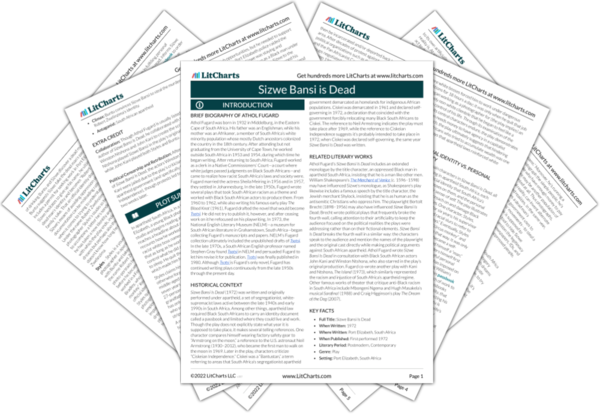Apartheid Quotes in Sizwe Bansi Is Dead
STYLES: I worked at Ford one time. We used to read in the newspaper . . . big headlines! . . . ‘So and so from America made a big speech: “. . . going to see to it that the conditions of their non-white workers in Southern Africa were substantially improved.”’ The talk ended in the bloody newspaper. Never in the pay packet.
STYLES: ‘Gentlemen, he says that when the door opens and his grandmother walks in you must see to it that you are wearing a mask of smiles. Hide your true feelings, brothers. You must sing. The joyous songs of the days of old before we had fools like this one next to me to worry about.’ [To Bradley.] ‘Yes, sir!’
STYLES: You must understand one thing. We own nothing except ourselves. This world and its laws, allows us nothing, except ourselves. There is nothing we can leave behind when we die, except the memory of ourselves.
STYLES: Here he is. My father. That’s him. Fought in the war. Second World War. Fought at Tobruk. In Egypt. He fought in France so that this country and all the others could stay Free. When he came back they stripped him at the docks—his gun, his uniform, the dignity they’d allowed him for a few mad years because the world needed men to fight and be ready to sacrifice themselves for something called Freedom […] When he died, in a rotten old suitcase amongst some of his old rags, I found that photograph. That’s all. That’s all I have from him.
MAN: I don’t want to leave Port Elizabeth.
BUNTU: Maybe. But if that book says go, you go.
MAN: Can’t I maybe burn this book and get a new one?
BUNTU: Burn that book? Stop kidding yourself, Sizwe! Anyway, suppose you do. You must immediately go apply for a new one. Right? And until that new one comes, be careful the police don’t stop you and ask for your book. Into the Courtroom, brother. Charge: Failing to produce Reference Book on demand. Five rand or five days.
BUNTU: That’s it, brother. The only time we’ll find peace is when they dig a hole for us and press our face into the earth.
[Our man is amiably drunk. He addresses the audience.]
MAN: Do you know who I am, friend? Take my hand, friend. Take my hand. I am Mister Bansi, friend. Do you know where I come from? I come from Sky’s place, friend. A most wonderful place. I met everybody there, good people. I’ve been drinking, my friends—brandy, wine, beer . . . Don’t you want to go in there, good people? Let’s all go to Sky’s place.
MAN: It will tell you in good English where he stays. My passbook talks good English too . . . big words that Sizwe can’t read and doesn’t understand. Sizwe wants to stay here in New Brighton and find a job; passbook says, ‘No! Report back.’
Sizwe wants to feed his wife and children; passbook says, ‘No.’
MAN: [Turning away from Buntu to the audience.]
What’s happening in this world, good people? Who cares for who in this world? Who wants who?
Who wants me, friend? What’s wrong with me? I’m a man. I’ve got eyes to see. I’ve got ears to listen when people talk. I’ve got a head to think good things. What’s wrong with me?
[Starts to tear off his clothes.]
Look at me! I’m a man. I’ve got legs. I can run with a wheelbarrow full of cement! I’m strong! I’m a man. Look! I’ve got a wife. I’ve got four children. How many has he made, lady? [The man sitting next to her.] Is he a man? What has he got that I haven’t . . . .?
MAN: [handing it over]. Take it, Buntu. Take this book and read it carefully, friend, and tell me what it says about me. Buntu, does that book tell you I’m a man?
[Buntu studies the two books. Sizwe turns back to the audience.]
That bloody book . . . ! People, do you know? No! Wherever you go . . . it’s that bloody book. You go to school, it goes too. Go to work, it goes too. Go to church and pray and sing lovely hymns, it sits there with you. Go to hospital to die, it lies there too!
BUNTU: It’s your only chance!
MAN: No, Buntu! What’s it mean? That me, Sizwe Bansi . . .
BUNTU: Is dead.
MAN: I’m not dead, friend.
BUNTU: We burn this book . . . [Sizwe’s original] . . . and Sizwe Bansi disappears off the face of the earth.
BUNTU: When the white man sees you walk down the street and calls out, ‘Hey, John! Come here’ . . . to you, Sizwe Bansi . . . isn’t that a ghost? Or when his little child calls you ‘Boy’ . . . you a man, circumcised, with a wife and four children . . . isn’t that a ghost? Stop fooling yourself. All I’m saying is be a real ghost, if that is what they want, what they’ve turned us into.
MAN: A black man stay out of trouble? Impossible, Buntu. Our skin is trouble.












